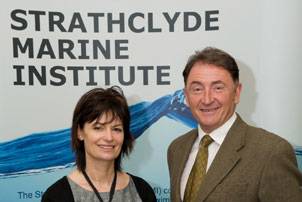
A new institute dedicated to pioneering research and technology for the marine sector has been launched at the University of Strathclyde in Glasgow. Scotland's Chief Scientific Adviser, Professor Anne Glover, met with researchers from the institute, which aims to contribute to the UK's marine economy by providing industry and government with cutting-edge research into marine energy, the environment and transport.
The Strathclyde Marine Institute will combine expertise from the fields of engineering, science, business and the humanities to examine the full spectrum of marine research and assist in the further development of a thriving maritime sector. Professor Glover said: “Scotland’s marine environment is a unique resource, providing fisheries, energy and mineral resources, routes for transport and opportunities for leisure and tourism, and a range of distinctive habitats. The marine and coastal waters around Scotland are vitally important to the sustainable future of our economy, demonstrated by the Saltire Prize, Scotland’s £10 million energy challenge to the world.
Professor Jim McDonald, Principal of the University, said: "The new institute will bring teams of multi-disciplinary researchers together with industry to find solutions to complex problems and investigate the sustainable development of the sea's resources.
"Scotland is well placed to capitalize on the global demand for offshore energy technology, competitive marine transport systems and research to minimize human impact on the environment. The institute, in partnership with our colleagues in industry, will have an important role to play in maximizing opportunities in the marine sector through education, research, and innovation."
Research and development at the institute will be based around the key themes of energy, environment and transport.
• Energy related R&D will focus on key areas of performance improvement and cost reduction of offshore wind, marine and tidal devices, as well as the improvement of performance of offshore oil and gas platforms. Researchers will also look at alternative fuels and power supply systems, and energy demand reduction in shipping.
• Environmental research will improve our understanding of the impact of human activity on the ocean and seas on marine resources. Research groups will be engaged in areas including modelling the ecological population, the impact of industrial pollutants, shipbuilding and shipping.
• Transport research groups will develop research and innovation crucial to the further development of the high-technology industry. The Institute aims to help industry develop safer, greener and more competitive marine transport systems.
In addition, researchers will investigate themes including food, aquaculture and fisheries; socio economic sciences and humanities; tourism and coastal zone development; and marine biotechnology.
www.strath.ac.uk/marine



